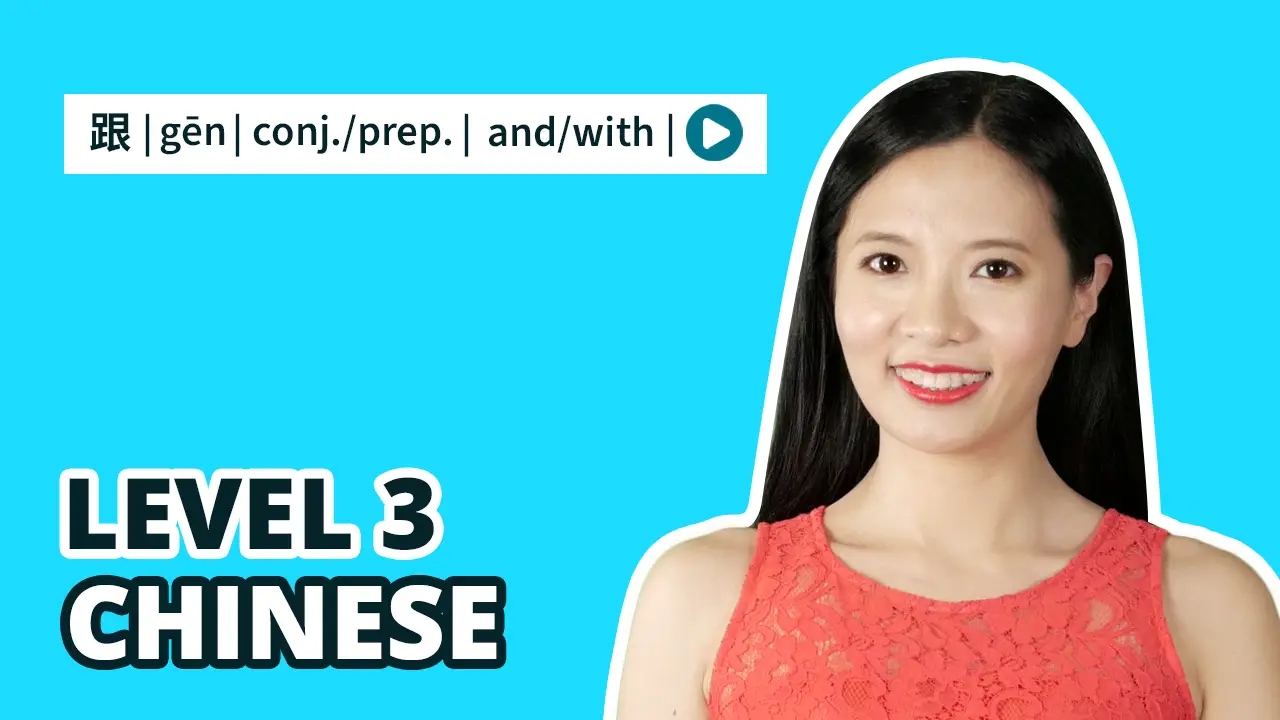Level 3 Lesson 4.2 – HSK不但考了,而且成绩是班里最好的。
GRAMMAR: 1. 施事主语 vs. 受事主语; 2. 不但……而且…… "not only...but also..." in Chinese
In this HSK 3 video lesson we'll learn about the differences between 施事主语 vs. 受事主语. We'll also learn how to use the structure 不但……而且…… to say "not only...but also..." in Chinese.
- 施事主语 vs. 受事主语
- 不但……而且……
GRAMMAR
Grammar 1. 施事主语 vs. 受事主语
Shīshì Zhǔyǔ vs. Shòushì Zhǔyǔ ▸ Subject that performs an action vs. Subject that receives an action
In Chinese there can be two types of 主语 (Zhǔyǔ ▸ Subject), 施事主语 (Shīshì Zhǔyǔ ▸ a Subject that performs an action) and 受事主语 (Shǒushì Zhǔyǔ ▸ a Subject that receives an action).
施事主语 example sentences:
In the sentence below, 你 is the Subject of the sentence, and because the action 拿 is performed by 你, 你 is a 施事主语.
Nǐ ná yǎnjìng le ma?
你拿眼镜了吗?
(Did) you take (the) glasses?
In the sentence below, 他 is the Subject of the sentence, and because the action 说 is performed by 他, 他 is a 施事主语.
Tā shuō Pǔtōnghuà shuō de tèbié hǎo.
他说普通话说得特别好。
He speaks Standard Chinese very well.
受事主语 example sentences:
In the sentence below, 眼镜 is the Subject of the sentence. The action 拿 is performed by someone not mentioned in the sentence, but the action 拿 is received by 眼镜. Therefore, 眼镜 is a 受事主语.
Yǎnjìng ná le ma?
眼镜拿了吗?
(Have) the glasses (been) taken?
In the sentence below, (他的)普通话 is the Subject of the sentence. The action 说 is not performed, but received by 普通话. Therefore, 他的普通话 is a 受事主语.
Tā de Pǔtōnghuà shuō de tèbié hǎo.
他的普通话说得特别好。
His Standard Chinese is spoken very well.
❖ In Chinese, 受事主语 is used a lot more than 被动句 (Bèidòng Jù ▸ Passive Sentences), which grammatically can be considered as the equivalent of the Passive Voice in English. Below are more examples.
受事主语
Shòushì Zhǔyǔ ▸ Subject that receives an action
- Zhè tào fángzi yǐjīng mài le.
这套房子已经卖了。
This set of house or apartment has already been sold. - Kùzi huàn le ba, tài zāng le.
裤子换了吧,太脏了。
Pants should be changed, they are too dirty. - 《Pūtōnghuà》Dì shí’èr kè yǐjīng xué guo le, Shísān Kè hái méi xué.
《普通话》第十二课已经学过了,十三课还没学。
Lesson 12 of Standard Chinese has already been learned, Lesson 13 has not been learned yet.
Grammar 2. 不但……而且……
búdàn……érqiě…… ▸ not only...but also...
We can use 不但……而且 to say not only but also in Chinese. When we say 不但A而且B, what is stated in B has to go further than what is stated in A.
However, 虽然 and 但是 can only be used to link two 单句 (Dānjù ▸ Simple Sentence) together to form a 复句 (Fùjù ▸ Complex Sentence). While 不但 and 而且 can be used to link 词 (Cí ▸ Word), 短语 (Duǎnyǔ ▸ Phrase) and 单句 (Dānjù ▸ Simple Sentence).
Grammatically, 不但 and 而且 are both 连词 (Liáncí ▸ conj.). We can use them
- to link two 词 (Cí ▸ Word) or two 短语 (Duǎnyǔ ▸ Phrase) together to form a 单句 (Dānjù ▸ Simple Sentence), or
- to link two 分句 (Fēnjù ▸ Clause) to form a 复句 (Fùjù ▸ Complex Sentence).
(1) 不但……而且…… linking two words or phrases:
- Zhèr de shēnghuó bùdàn fāngbiàn, érqiě piányi.
这儿的生活不但方便而且便宜。
Life here is not only convenient but also inexpensive. - Xiǎo Dài búdàn hěn niánqīng, érqiě hěn piàoliang.
小戴不但很年轻而且很漂亮。
Little Dai is not only young but also pretty.
(2) 不但……而且…… linking two clauses:
- Yéye niánqīng de shíhou búdàn hěn shuài, érqiě duì nǎinai tèbié hǎo.
爷爷年轻的时候不但很帅,而且对奶奶特别好。
When grandpa was young, he was not only handsome but also very good to grandma. - Cài búdàn zuò le, érqiě jiǔ yě zhǔnbèi le.
菜不但做了,而且酒也准备了。
Not only have the dishes been made, but also the wine has been prepared. - Wǒ búdàn sòng tā qù jīchǎng le, érqiě tā huílai de shíhou wǒ yě qù jiē tā le.
我不但送他去机场了,而且他回来的时候我也去接他了。
I not only took him to the airport, but also picked him up when he came back.
